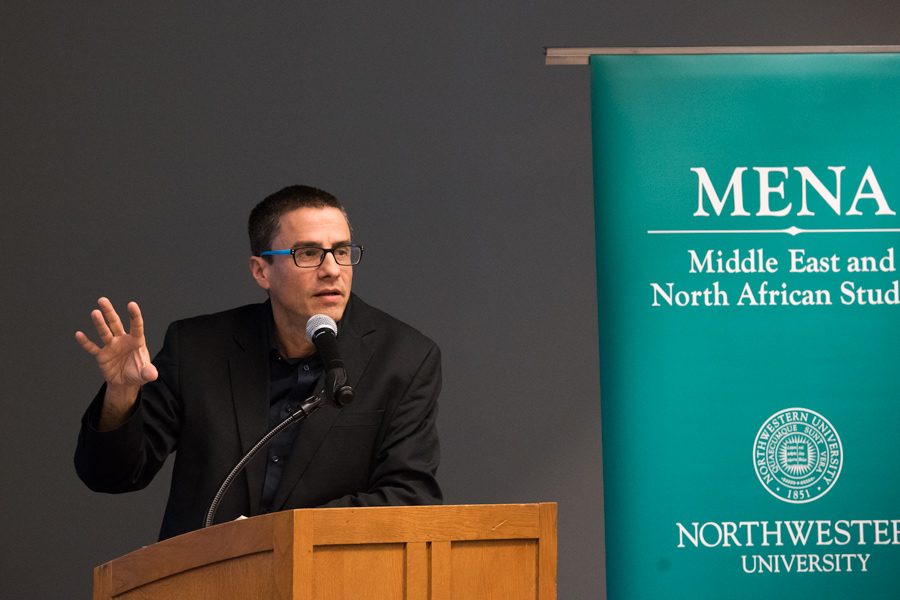Israeli professor shares 1-state solution to Israeli-Palestinian conflict at MENA, EPL event
Kate Salvidio/The Daily Northwestern
Israeli professor Neve Gordon discussed the Israeli-Palestinian conflict at a Monday event. He said his one-state solution considered the human rights of Palestinians and Israelis.
November 14, 2017
Israeli professor Neve Gordon outlined a one-state system comprising both Israeli and Palestinian representatives as a solution to the ongoing conflict at a Monday event co-sponsored by Northwestern’s Middle East and North African Studies Program and Evanston Public Library.
Gordon told roughly 150 audience members at EPL that his one-state solution includes group veto powers and shared power within the executive branch. The solution, he said, was modeled on an agreement that mitigated the conflict between the United Kingdom and the Republic of Ireland in the 1990s.
Gordon said group representation would protect human rights of both groups.
“A democracy has to be for all its citizens or all the inhabitants of the land,” Gordon said. “And I think it cannot be based … on class and money, and it certainly cannot be based on religion.”
MENA director Brian Edwards, who helped organize the event, told The Daily he wanted to highlight the 50th anniversary of the 1967 Arab-Israeli War. He added that the conflict poses “a very difficult and fraught question.”
“This series is really meant to cater to a general informed public,” Edwards said. “One of the assumptions, I think, talking about the Middle East is that there is only a limited number of areas within it that people focus on frequently.”
University associate chaplain Tahera Ahmad, who attended the event, told The Daily that the conflict is “often very controversial.” Ahmad, who is also the director of interfaith engagement, said she thought everyone in attendance was helpful in allowing “different voices” to discuss the topic.
“These conversations need to continue, to hear different perspectives, to continue forums that allow us to be thoughtful and engaging,” Ahmad said.
Gordon, a politics professor at Ben-Gurion University of the Negev in Israel, said an increasing population of Israeli settlers within the West Bank has made past negotiations futile.
He also discussed misconceptions surrounding the Israeli-Palestinian conflict, focusing on the underlying demographics of the region. Gordon said the birthrate of ultra-Orthodox Jews in the West Bank has outpaced that of other Israeli settlers in the region since the 1990s, making it difficult for politicians to negotiate a solution.
“All the religious party representatives turned way right since the early 1990s and … will not vote for a party that’s for some kind of solution with the Palestinians,” Gordon said.
Gordon acknowledged that his solution might not be perfect for the current political environment, but remained hopeful on the prospect of future negotiations.
“We have to be pragmatic and we have to dream at the same time,” Gordon said. “What is the most workable is to continue with the status quo, and if we want to make a change, then we have to dream and we have to leap.”
Email: [email protected]


